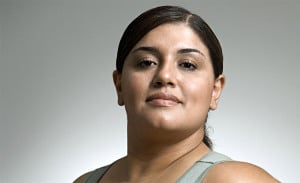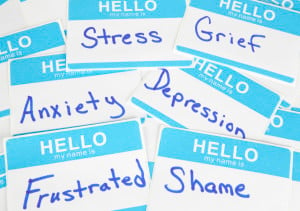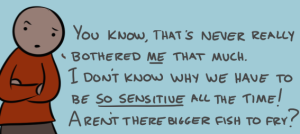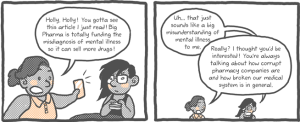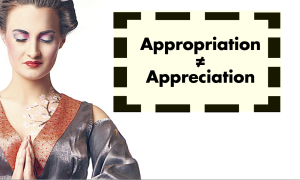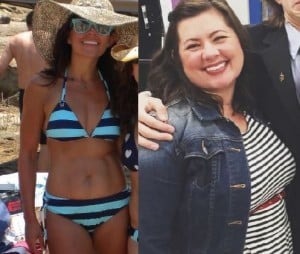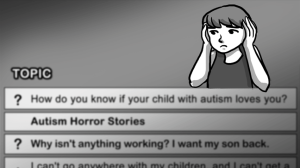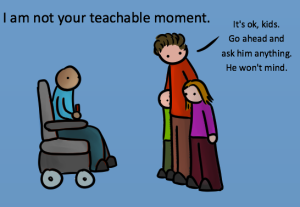
A person holding their fingers in an X toward the camera. Source: Wikihow
When it comes up in conversation, people are shocked by my choice. People who have or want children sometimes seem offended by it. Others brush it off, saying I’ll change my mind someday.
Maybe it’s surprising that I don’t want to start a family – because I am a woman who doesn’t hate children. In fact, I’ve worked with children for years, and I’d like to think I’m fairly good at it. I have a tendency to nurture others and cater to their needs.
Not to mention, I present myself in a relatively feminine way, which makes people assume I am straight (spoiler alert: I’m not!) and could bear a child whenever I feel like it (also a faulty assumption).
My experience and personality make it easy to assume that I could be a mother one day.
There are a handful of assumptions people may make when you say that you don’t plan on starting a family, especially if you are a woman.
Some may think you’re immaturely trying to be unique. Others may believe that some experience “ruined” children for you. And there will be people who assume you are a callous kid-hater and/or a workaholic.
I don’t know if an immature person going against the grain for shits and giggles should have a kid just yet anyway. And if someone had an experience that led them to a decision not to have children, why anyone fault that? Uhh, if someone hates kids, they shouldn’t raise kids. Also, commitment to work isn’t an evil thing.
Even the often misguided assumptions made about non-parents have validity.
The truth is, if you don’t want to have children for any reason, it’s valid!
The more I think about it, the statement “I don’t want to” is a valid reason in and of itself. Raising children that you didn’t want in the first place is an unhappy situation for everyone.
If you don’t want to have children, you are not wrong, and you are not alone.
Here are five more reasons why it is completely okay to decide not to become a parent:
1. Kids Are Expensive
In the first year alone, a parent can spend thousands of dollars as the sole provider in a small person’s life.
As years go by, diapers and bottles are replaced with school supplies and saving for higher education, if possible. It adds up.
There’s a reason tax forms consider children “dependents.”
For at least eighteen years (unless the they become legally emancipated), children rely on their parents for all their needs. That doesn’t even include the fun, millenial trend of graduating college then moving back home with the parents.
Talk about a huge emotional and financial responsibility!
Between the expense and today’s economy, raising children is far from cheap. For some, it is flat-out unaffordable. I am in awe of all parents who make it work.
Child-rearing may not be how you want to spend your money. That is understandable.
Maybe you don’t want to bring new people into your family if you can’t afford to support them. That reasoning is beneficial to both you and a potential child, should you choose to have one.
Money is personal.
Decisions regarding our bodies and lives should be equally personal.
You choose how you spend your money. You choose what goes on with your body. You choose what you can in your way of life.
2. Complications Happen
Whenever my elders question why I do not want to have children, I think that they are conveniently ignoring some facts of life.
Some people cannot physically have children, have a medical history of reproductive health issues, and/or have miscarried. Fertility treatments are not 100% guaranteed to work, and they are expensive. You know what else is super-expensive? Hiring a surrogate.
Also, an idea often forgotten when it comes to baby-making: Not everyone has penis-in-vagina sex!
As a cisgender lesbian in a relationship with another cisgender woman, my sex life doesn’t include pregnancy prevention. I literally cannot have an “Oops Baby.”
In fact, if I wanted to have a child physically or through adoption, it would be a “Plan It Out and Lawyer Up Baby.”
Speaking of adoption, the U.S. process of application, home study, approval, matching, placement, and legalization is arduous for everyone, especially marginalized groups.
There are so many physiological, financial, and legal obstacles that can occur before a child enters a family. Some people know the risks and start families anyway, which speaks to their commitment.
If it’s not for you, though, that’s absolutely okay.
3. You Have to Work It Out
Nothing is impossible, but certain careers and lifestyles present even more challenges to families.
Parents who work in volatile job markets risk raising children while unemployed for stretches of time, or they uproot their families to relocate to the newest gig.
Parents whose jobs require travel have to rely heavily on their spouses, family, friends, and/or childcare to fill in for them during periods of absence.
If two parents live far away from each other, but both want to be involved in their children’s lives, it requires a lot of planning, compromise, and sometimes frequent-flyer miles.
The logistics of these situations are stressful from an adult perspective, and that’s before factoring in how the child could feel.
As I said before, nothing is impossible. There are plenty of families who raise healthy, well-adjusted children, even in more difficult circumstances.
Feminism is about choice.
All people should have the choice to enter the workforce in the industry of their choosing. All people should have the choice to be parents if that is what they want.
Choosing not to have children is a completely valid option as well.
4. ‘Parent’ Is a Noun and a Verb
Having a child is not the same thing as parenting, which is pretty much why the term “deadbeat dad” was coined in the first place.
Obviously, gender does not determine whether or not someone will be actively involved in their child’s life. Only an individual can make that decision to parent, not just passively be a parent.
It is both magical and terrifying to realize that raising a child ultimately means raising a person. Parents’ actions (or inaction) become their children’s memories.
Some people welcome that pressure. Some people don’t.
Keeping a kid alive and safe is one thing. Guiding them through life in the outside world is another task entirely. To say that parenting requires extreme effort would be an understatement.
The idea of shaping a young person’s past, present, and future is scary, to say the least. If you choose not to face that fear, I don’t blame you.
5. Sacrifice Should Not Be Taken Lightly
I am grateful to my parents. I know what they went through to raise me was incredibly difficult.
This applies to all parents.
If parenting were easy, everyone would be good at it. Unfortunately, this is not the case. Exceptional parents deserve immense praise and respect.
Parenting requires selflessness. If someone does not want to be selfless, they probably do not and should not want to start a family. It doesn’t make you a bad person if you choose not to make an optional sacrifice.
This isn’t a slight to parenthood. I commend the people who choose to give up so much for another life. I would never trivialize what parents do by implying that just anyone could do it, let alone do it well.
If you feel like parenthood is an immense sacrifice that will test your will, wallet, schedule, and patience, you are definitely not alone. This is why starting a family is such a huge decision.
You are by no means obligated to compromise your life as you know it by having children. Nobody is forcing you to start a family, even though the media, your family, and your social media feeds may make you feel that way sometimes.
***
As I’ve mentioned before, I have deep respect for involved parents. Raising children is one small, but poignant way to impact the next generation of adults. That is no small task.
Part of the reason why I respect parents so much is because I have felt immense pressure to at least think about becoming a mother.
And I’m going to go out on a limb here and say this pressure probably stems from the fact that I am a woman.
Here’s my feminist stink on that: Women do not need to be mothers to have worth.
To imply that motherhood is intrinsic to the female experience is limiting at best. The idea of parenthood as a requirement to a fulfilled life contributes to the pressure to “Have it All.”
“Having it all” doesn’t have to mean “having children.”
That’s not realistic for everyone. My wants and needs in life are different than yours, and yours are different from those of others. You don’t have to check off society’s rigid boxes to thrive.
My lesbian identity doesn’t stop people from pushing the idea of motherhood onto me, either. Because I happen to live in a liberal state where I can get same-sex-married, there still lies a lingering expectation to “give my mother grandchildren.”
I’m pretty sure that logic is counterintuitive to the marriage equality movement, but that’s a story for another day.
Regardless of gender or orientation, major life decisions should not be dictated by familial or societal pressures alone.
What is right for other people may not be your path, and there is nothing wrong with that.
[do_widget id=”text-101″]
Maddie McClouskey is a Contributing Writer for Everyday Feminism. She’s a twenty-something lesbian in New York City and currently writes weekly dating advice pieces for the LGBTQ event app and website SheSeekOnline and was a regular contributor to the sexuality and feminism site ToughxCookies. When she’s not writing articles about gayness, she’s performing stand-up comedy, singing show tunes to her girlfriend and dog against their will, or making up jokes for Twitter @SoundofMaddie. Read her articles here.
Search our 3000+ articles!
Read our articles about:
Our online racial justice training
Used by hundreds of universities, non-profits, and businesses.
Click to learn more





